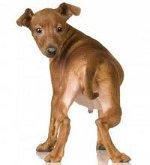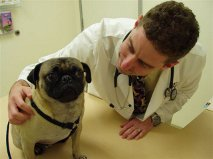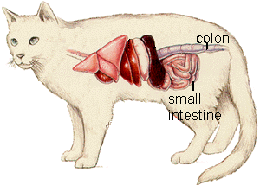Diarrhea is a symptom, not a disease. Many things can cause diarrhea, but most of the time your pet has eaten something bad or overate, or has a viral infection or parasites. When something irritates the intestinal tract, your dog or cat’s body responds by constricting and relaxing the intestinal tract in  waves, to expediently push out the irritant. Because this speeds up the flow of material through the bowels, water is not absorbed as usual, and everything comes out in a mushy mess.
waves, to expediently push out the irritant. Because this speeds up the flow of material through the bowels, water is not absorbed as usual, and everything comes out in a mushy mess.
Frequent diarrhea can result from chemical poisoning, a bacterial or viral infection, food sensitivities, prescription drugs, internal parasites, or a problem with an organ such as the liver or pancreas. If you suspect any of these conditions, see your holistic veterinarian right away.
It’s important to see a veterinarian who is experienced in nutrition and naturopathy because if you take your pet to a conventional veterinarian, he or she is likely to tell you to feed a commercial pet food.  This is not in the best interest of your pet. The extent of nutritional training in conventional vet school curriculums usually consists of a class taught by a representative of one of the big pet food companies. These companies sponsor the vet schools.
This is not in the best interest of your pet. The extent of nutritional training in conventional vet school curriculums usually consists of a class taught by a representative of one of the big pet food companies. These companies sponsor the vet schools.
You may be alarmed if you see blood in your pet’s stool, but in dogs and cats, it generally isn’t too serious. When the blood is bright red and on the surface of the stool, there is a good chance that something sharp, like a bit of bone, scraped the lining of the colon and made it bleed. The bleeding may continue for a day or two, but it probably won’t last much longer. Even small scrapes can cause a lot of bleeding, so don’t be surprised if the stools appear quite red.
Blood in the stool may also be a sign of parasites which are irritating the intestinal wall, or of an anal sac infection.
If the blood looks dark or black and is mixed with the stool, there may be a problem in the small intestine, near the stomach. Some viral infections can temporarily irritate the walls of the small intestine and make it bleed.
Even though the blood will probably disappear in a day or two, it still means something is wrong, and you should see a holistic veterinarian to rule out any serious causes.
If you noticed diarrhea after your pet ingested an herb, nutritional supplement, prescription, dairy product, or unusual food, the symptom will probably go away shortly after these ingestions are discontinued.
 If the diarrhea is due to changing from a commercial diet to a natural diet, give it some time. The body goes through a process of eliminating toxins when switching to a new, healthier food. Make sure the ingredients are fresh, and have not been sitting at room temperature for extended periods of time. Also make sure your pet’s bowls are kept clean. Feeding a probiotic and digestive enzymes can help with the transition, too. See Transitioning Tips.
If the diarrhea is due to changing from a commercial diet to a natural diet, give it some time. The body goes through a process of eliminating toxins when switching to a new, healthier food. Make sure the ingredients are fresh, and have not been sitting at room temperature for extended periods of time. Also make sure your pet’s bowls are kept clean. Feeding a probiotic and digestive enzymes can help with the transition, too. See Transitioning Tips.
If the following treatments don’t seem to be helping, do a careful assessment of your pet’s environment. Is there a new allergen nearby, where has your dog or cat been visiting lately, was a new flea treatment used? Does your pet have access to somebody’s garbage? Bird poop? Symptoms may be recurring because the irritant is recurring.
Herbal and Naturopathic Help
Fasting is an important step in the treatment of diarrhea. Your dog or cat will probably fast on its own if feeling ill. Make sure plenty of fresh, filtered water is available. A liquid fast allows the digestive tract to clean itself out and to rest. Also, dishes should be made from stainless steel, glass or quality ceramics with no toxic paints or shellacs. See Fasting for more information.
 Diarrhea can cause dehydration and a loss of essential minerals. In addition to water, there are a few other liquids you can provide your pet to replenish the lost minerals, the same way babies are given Pedialyte.
Diarrhea can cause dehydration and a loss of essential minerals. In addition to water, there are a few other liquids you can provide your pet to replenish the lost minerals, the same way babies are given Pedialyte.
In his book, Natural Health for Dogs and Cats, Dr. Pitcairn recommends giving a broth made from a meaty bone, vegetables, brown rice, and a small amount of soy sauce. Give only the liquid and serve it at room temperature.
CJ Puotinen, in her book, The Encyclopedia of Natural Pet Care, says you can make your own electrolyte replacement using:
- 2 cups water
- 1 tablespoon unrefined sea salt
- ¼ teaspoon liquid colloidal trace minerals
- ½ cup raw honey
In addition to the liquid fast, slippery elm powder has been shown to be a very effective treatment for diarrhea. Dr. Pitcairn suggests this method: put a slightly rounded teaspoon of slippery elm in a cup of cold water and mix it thoroughly. Then bring the mixture to a boil, while stirring. Turn the heat down to a low temperature and stir the slippery elm sauce until it starts to thicken. For dogs, add a teaspoon of honey. For cats, don’t. Cool the mixture to room temperature and use the dosing schedule below.
| Cats and dogs up to forty pounds | One-half to one teaspoon |
| Forty-five to seventy pound dogs | Two teaspoons to two tablespoons |
| Dogs seventy-five pounds and up | Three to four tablespoons |
If you think your pet’s diarrhea is caused by eating something that was bad for him, such as spoiled food or any poisonous substance, activated charcoal is a tried and true remedy which is also used in humans. Activated charcoal absorbs toxins. See the First Aid Kit page for dosing instructions, and don’t use for extended periods of time because not only will it absorb the toxins, and rid the body of them, activated charcoal will also absorb some of the nutrients your pet’s body needs.
Some experts believe that the body ought to be allowed to run its course of diarrhea, because that’s how it rids the body of things that should be eliminated. However, if you’re worried about dehydration or malnutrition, or just want to stop the diarrhea, here are some remedies:
- Ripe blackberry – in fresh or powdered form can squelch an attack of the bowels.
- Roasted carob powder – used as a soothing remedy for dog and cat diarrhea.
- Colostrum – secreted from the mammary glands of pregnant animals, this “pre-milk” is used as a preventative and cure for diarrhea.
- Clay powder mixed with water – this is the key active ingredient in Kaopectate. Use green benonite, montmorillonite, or bentonite. Or just use Kaopectate.
- Pectin – absorbs fluid, helping to create firmer stools, and is the other main ingredient in Kaopectate.
- Psyllium – absorbs fluid, creating firmer stools.
Also give acidophilus not only to prevent and cure diarrhea, but to help restore intestinal health and nutritional balance.
Homeopathy
Homeopathy is very specific, and there are many reasons why your dog or cat could have diarrhea. If you know the cause and have done a thorough examination of the symptoms, here are some homeopathic treatments:
If your pet doesn’t seem particularly thirsty, and has overeaten or eaten excessively fatty foods, give Pulsatilla 6c every four hours for a total of six treatments.
If there is frequent straining with not much output, and your pet is also vomiting, give Nux vomica 1m every four hours for a total of six treatments.
 If the diarrhea gushes out forcefully and smells exceptionally bad, give Podophyllum 6c every four hours for a total of six treatments.
If the diarrhea gushes out forcefully and smells exceptionally bad, give Podophyllum 6c every four hours for a total of six treatments.
If your pet has frequent, straining, bloody bowel movements after eating a toxic substance or contracting a viral infection, give Mercuris vivus 6c every four hours for six treatments.
If your cat appears ill at ease after eating, and has dark, bad-smelling, long-lasting diarrhea, give Natrum muriaticum 6c every four hours for six treatments.
If your dog has pronounced redness around the anus and is scratching a lot, or has a musty body odor, give Sulphur 6c every four hours for six treatments.
If your dog or cat ate bad meat and has frequent, small, loose bowel movements, chills, feebleness, and thirst, give Arsenicum album 6c every four hours for six treatments.